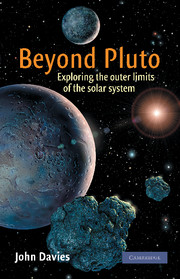Review of the hardback:‘… a pleasing book with an elegant style …’.
Source: Astronomy & Geophysics
Review of the hardback:‘Beyond Pluto is a candid, detailed and well illustrated book that takes the general reader on an intriguing journey to the far frontiers of astronomical research.’
David Hughes
Source: New Scientist
Review of the hardback:‘… a must for comet enthusiasts and armchair astronomers wishing to gain a sense of what the outermost provinces of the Sun’s dominion may be like.’
Neil English
Source: Astronomy Now
Review of the hardback:‘… there is something here for everyone. For the non-professional, Davies discusses the tools and art of astronomical research in a practical manner … For the expert and research astronomer, this account provides context for the ongoing work in the field as well as an excellent overview of the driving questions and current state of knowledge … it is a pleasure to have a book that is readable at so many levels and able to describe the concepts and relevance of such a new field of research.’
Joel Wm. Parker
Source: Nature
Review of the hardback:‘… an overview of a rapidly developing research that is accessible to the non-specialist and as such is particularly welcome. Anyone interested in solar system studies and the formation and evolution of the planets will want to buy this book.’
Richard Taylor
Source: Spaceflight
Review of the hardback:‘A modern story of scientific discovery, showing how theory and practice interact.’
Source: Europe & Astronomy
Review of the hardback:'The book gives an accessible account of the historical context of research into objects beyond Pluto. … what brings the book to life is the fascinating insight Davies gives into the nomadic existence of young professional astronomers, the excitement of observations which confirm orbital predictions, the frustration of having not quite enough clout to get crucial telescope time, and the ingenious ways of making the most of what resources they do get. … Anyone wanting an insider's account of this continuing voyage of discovery should read Davies' book. Thoroughly recommended.'
Source: Newsletter of the Federation of Astronomical Societies
Review of the hardback:‘… an immensely enjoyable read.’
Simon Green
Source: The Observatory





